Auld Lang Syne: Bookdal’s Favorite Reflections on Supernatural
Singing the Sins of Creon:
Supernatural’s Season Six and the Prohibition Against Mourning
Originally Published: June 9, 2011
I am your mirror, and here are your stones.”
-Rumi, translated by Coleman Barks
A Beautiful Labor: The Work of Mourning
 “The person who grieves, suffers his passion to grow upon him; he indulges it, he loves it” – Edmund Burke, On the Sublime and Beautiful
“The person who grieves, suffers his passion to grow upon him; he indulges it, he loves it” – Edmund Burke, On the Sublime and Beautiful
At the end of its fifth season Supernatural died, or at least one version of it did. The five year arc that began with the death of a mother ended with the death of a brother. The story organized itself toward a battle between destiny and free will, between redemption and damnation, between Michael and Lucifer, and it concluded in an appropriate setting: a hometown cemetery.
“Swan Song” marked the death of a story, and the following sixth season provoked an unusual but expected dilemma for both writers and audience: How do we read the next story – as rebirth or resuscitation?
As a viewer, season six has confounded me and part of that confusion comes from such a dilemma. Resuscitation averts death – skirts close to it but rebounds to a wholesome state. Resuscitation is elegant. Rebirth, however, is inelegant and clumsy – once something is dead, it is dead, and anything that comes back to take its place is different, never to be the same as that which died.
And this theme strikes at the heart of the Supernatural story. 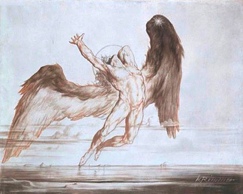 The running notion of the “natural order” and what happens when humans upend that order are the stakes that the show raises again and again throughout its plot. And while the show follows the Winchester brothers, the story begins with the “unnatural” or “supernatural” death of the mother. So the emotion that most readily accompanies this upturned order is grief. The narrative, filled with the deaths of mothers, fathers, brothers, and friends, tries to perform the act of mourning throughout its first five seasons, but it often stops short of the ritual because death is deterred. As Dean once said, “I never should’ve come back, Sam. It’s not natural and now look what’s come of it. I was dead. I should’ve stayed dead.”
The running notion of the “natural order” and what happens when humans upend that order are the stakes that the show raises again and again throughout its plot. And while the show follows the Winchester brothers, the story begins with the “unnatural” or “supernatural” death of the mother. So the emotion that most readily accompanies this upturned order is grief. The narrative, filled with the deaths of mothers, fathers, brothers, and friends, tries to perform the act of mourning throughout its first five seasons, but it often stops short of the ritual because death is deterred. As Dean once said, “I never should’ve come back, Sam. It’s not natural and now look what’s come of it. I was dead. I should’ve stayed dead.”
The deferral of death dominates the storyline of Supernatural, and as a result, the mourning and melancholic nature of the Winchesters’ lives becomes the driving force of the plot. This notion also frames the show – and one should read mourning against the fifth season finale and the entirety of the sixth season storyline. Kripke was very adamant that his story had ended with season five; even going so far as to use the character of Chuck to part narrate/part eulogize his version of the Winchester story. But that was Kripke’s eulogy. It was Kripke’s interaction with his audience, with those who were following his story. As he bids his farewell, the door stands open, the grave remains unoccupied. The story dies, but yet it does not die. It comes back – reborn, reformed.
So what to take away from this new story, if it is new? Is it zombie? Is it real? Is it damaged? Can it be the same as it was? Or is it forever an imitation? And what to do with the grief for the story that has died?
Mourning forestalls the answers to these questions – 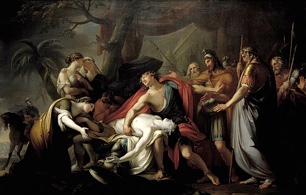 death answers itself, loss is loss. Freud once described the work of mourning as the work of detaching from a deceased object of love. Melancholia, on the other hand, draws on the work of mourning, but for an object that is dead emotionally but still physically alive. Melancholy, then, evokes a feeling of loss in the presence of the lost object. The end of Supernatural’s five year story opened the way to melancholy, for although one story was finished, another story appeared to take its place. A friend died; a friend remained.
death answers itself, loss is loss. Freud once described the work of mourning as the work of detaching from a deceased object of love. Melancholia, on the other hand, draws on the work of mourning, but for an object that is dead emotionally but still physically alive. Melancholy, then, evokes a feeling of loss in the presence of the lost object. The end of Supernatural’s five year story opened the way to melancholy, for although one story was finished, another story appeared to take its place. A friend died; a friend remained.
The social contract for Supernatural was based, in part, on the Kripke narrative on the Kripke vision of the Winchester story, so when he bows out of the community, how does that revise this tenuous social agreement? Rousseau wrote, “Each one of us puts into the community his person and all his powers under the supreme direction of the general will; and as a body, we incorporate every member as an individual part of the whole.” When a part falls away, what to do with the whole? Rousseau spends a lot of time contemplating how the social contract survives and flourishes, and even though his philosophy applies to a larger national scale, one can condense the experience to any community. The community surrounding Supernatural consented to a social contract with Eric Kripke; the contract centered on the Winchester story and the triumph of family over self, of choice over fate, of love over hatred, and finally, of brotherhood over the individual.
To my mind, the sixth season of Supernatural disrupts and prohibits the show’s audience from mourning the previous five years, an act which changes the terms of agreement in the social contract between Supernatural writer and Supernatural fan.
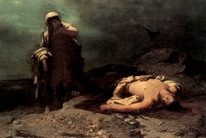 Bending Over Antigone: Dead Brothers and Female Mourners
Bending Over Antigone: Dead Brothers and Female Mourners
“The maid shows herself passionate child of passionate sire, and knows not how to bend before troubles.” – Leader of the Chorus, Sophocles’s Antigone as translated by RC Jebb
If the heart of the Supernatural story is brotherhood, then the heart of the Supernatural experience is the friendship among women. Over the years, the show has constructed a unique association with this audience, one filled with a sense of community that extends beyond the frame of the television screen. This community is acknowledged not only by the writers, but it is often (and increasingly) acknowledged within the text of the show itself. But the friendship, so far, has been based on a particular Winchester story, one that centered on brotherhood and clearly delineated what was wrong, what was right, what was monstrous, and what was worth saving. And although the show imagines (in The Real Ghostbusters) its fans as stacked with men, the most active fans of the show are women. And the end of season five cast these female witnesses into a role much akin to Antigone – the sister who is restrained from entombing the body of the brother. The show refused that process – there was no body to bury, no memorial to visit, no elegy to sing. Instead, the final scene of season five reveals the brother’s body restored, and with it the hope of rebirth.
Jensen Ackles, as Dean Winchester, intuitively plays this anguish of deferred mourning throughout season six. Remember that Dean’s promise at the end of season five was the oath of to bring the brother back, an oath that we must read in the portrayal of Dean as he copes with Sam and his incomplete return. At the heart of Dean’s character stands a strong moral impulse toward justice and law, which is ironic given his illicit lifestyle.  However, law is not simply the letter. It is the spirit. And the spirit of the law in Supernatural tends toward ordering what has been disordered, which makes the task of following the brother into figurative hell all the more poignant and sad.
However, law is not simply the letter. It is the spirit. And the spirit of the law in Supernatural tends toward ordering what has been disordered, which makes the task of following the brother into figurative hell all the more poignant and sad.
Dean, whom I would argue is a stand-in for the largely female audience, carries the brunt of the emotional work at the beginning of season six and beyond. He never mourned Sam, couldn’t mourn Sam, for that would be the admission of death’s victory; refusing to mourn allows Dean hope but it also brings him melancholy. And the audience, who saw Sam, knew him to be alive, carries the emotional work of silent remembering. Both states invoke the ghost and bring into being the psychic trauma of witnessing without effect. In Dean’s pain stands the falling Sam; in the audience’s pain stands the reborn Sam. And neither can communicate with the other, so the disconnect is made real and verges on dramatic irony.
So Dean and the audience dwell in the same emotional space, one of aborted mourning, which is the stage for angst, an angst that Ackles commented on throughout the season in interviews. As a fan of the show, but even more importantly, as the portrayer of the character through which much of the pathos of the story is told and subsequently felt, Ackles intuits the dissatisfaction of the aborted mourning, even if he does not articulate it as such. The sixth season constitutes a performance of sorrow that is never quite fulfilled because the show itself cannot seem to accurately represent its own ambivalence toward the brothers and their story.
So the task of Supernatural’s sixth season, which had been the promise of that final scene of Sam looking through the window, soon reveals itself to be the opposite of return. There was no restoration, no rebirth. The body was the corpse made animate. The season, then, marked a renegotiation of the terms of agreement, or better yet, the social contract between audience and text. The story frame that had been the middle ground between audience and writer was purposefully disrupted. Brothers were reunited, but brotherhood was gone. The hunt continued, but the hunt became game rather than mission. And although love existed, it transformed into a series of moments that tore down the erotics of Supernatural and replaced it with the quiet sorrow of unrequited affection. Mourning becomes melancholy.
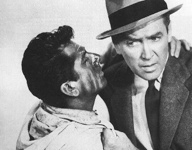 Noir is the Color of Grief
Noir is the Color of Grief
“Allow the claim of the dead; stab not the fallen.” – Tiresias, Antigone
If we use the road metaphor that the show has relied on for then we can see that the show’s first five years drove toward forgiveness and reconciliation, but the sixth season stopped at a crossroads and the turn it made took the story and its audience onto an alternative route where the moral and ethical rules from the previous seasons no longer applied. In fact, the sixth year of Supernatural became much like a photographic negative of a photographic negative, a copy of a copy. And the show, to my mind, made this turn on purpose and used the work of mourning as a way to re-frame its narrative.
By claiming film noir as its reference, the show made explicit its melancholy. The noir genre, as Tim Dirks (www.filmsite.org) defines it, depends on the themes of “melancholy, alienation, bleakness, disillusionment, disenchantment, pessimism, ambiguity, moral corruption, evil, guilt, desperation and paranoia.” Noir, then, overtakes the internal angst of the brotherhood, which had been part of the storytelling content and transforms that angst into a lens.
The effect of such a shift in the form of storytelling is immediate; the first episode of the season, “Exile on Main Street,” demonstrates the loneliness of Dean, the alienation of Sam, and the pessimism of a brotherhood lost. The final scene of this particular episode sees Sam drive off in another car, while the Impala hovers under tarp and memory in the garage, and Dean standing in the driveway watching his brother leave. The emotional impact on the audience could be interpreted as a double injury. The episode starts out with a montage of Dean within an unfamiliar context (home and hearth) and ends with Dean alone in an vacant driveway, an empty road. If Dean is the primary proxy for the mostly female audience, then his grief and guilt scaffolds the audience’s reading. The promise of this episode is a dark journey, one darker than any before because it begins with loneliness – a dramatic and decisive break from the pilot which had focused on the journey of a partnership.
At the other end of the journey, the season finale, which was nominally split into two parts entitled “Let it Bleed” and “The Man Who Knew Too Much,” fulfills the 22-episode agenda of emotional torture that moved the show into the realm of the melodramatic. Melodrama is a mode traditionally seen as appealing to a primarily female audience and often dismissed as failed allegory. Melissa Bruce, who used the Impala to examine the melodramatic in the first four seasons, argued that “By situating the Impala within the tradition of the film noir automobile, Supernatural places it specifically within a masculine space, while also using it as a symbol of emotion””a means through which the relationship between Dean and Sam can be read and understood. . . providing a stable and masculine space through which to explore the scenes of obvious emotion that so commonly pervade television melodrama.” (http://journal.transformativeworks.org/index.php/twc/article/viewArticle/154/157)
Bruce’s observations become even more prescient when directed toward the sixth season, which not only employs noir as its narrative frame, but extends the claustrophobia that’s inherent in film noir outward past the cameras and into the audience it has long seduced while simultaneously held at bay. Noir becomes the “vehicle” that carries the intensely emotional stakes that are raised in the story and turns that into the frame through which the audience must experience the story. Taken as a whole, the sixth season can be read as a metaphor about what happens when the creator confronts not only what it has created but all of that which was created as a consequence.
The rippling pool bends back toward the thrown stone.
The allegory at play in Supernatural’s sixth season,  at least to me, then betrays a meta-level meditation on the nature of the show, but more importantly, on the nature of the interaction between show and audience. The dissolution of the fourth wall in “The French Mistake” reveals this allegory, in part, because the episode serves as a direct acknowledgement of the television show’s audience and not the internal audience of the books that had become part of the canonical storyline. Once the show dissolves the fourth wall, it builds a fifth wall which captures the audience in the plot, a kidnapping that had already occurred but now was recognized. And it is recognized in the most darkly humorous scene of the episode, the death of Eric Kripke.
at least to me, then betrays a meta-level meditation on the nature of the show, but more importantly, on the nature of the interaction between show and audience. The dissolution of the fourth wall in “The French Mistake” reveals this allegory, in part, because the episode serves as a direct acknowledgement of the television show’s audience and not the internal audience of the books that had become part of the canonical storyline. Once the show dissolves the fourth wall, it builds a fifth wall which captures the audience in the plot, a kidnapping that had already occurred but now was recognized. And it is recognized in the most darkly humorous scene of the episode, the death of Eric Kripke.
As stated earlier, the deferral of mourning is the subtextual stakes at work in the sixth season, but it is a multi-dimensional mourning. Dean’s mourning of Sam, the audience’s mourning of the core brotherhood that was disrupted and reneged upon, the show’s mourning of Kripke’s departure, and so on. “The French Mistake” concedes the complicated emotions at play with the character of Kripke, who is absent for most of the episode but still there in spirit, as ghost, until he finally arrives (somewhat reluctantly). His death marks a moment of candid interaction between audience and show. He is dead, the show asserts. But still the mourning is deferred, becoming comedy and invoking laughter. The outside hero of the show (Kripke) is destroyed, but that does not solve the problem of the hero within the show.
The noir-ish nature of the sixth season attempts to examine this narrative, but the problem comes in constructing a heroic figure in such a dark landscape. If the hero of the film noir genre is often alienated, then it is difficult to discern who the hero is in Supernatural: Dean, Sam, Castiel, or us? I would argue that the show itself is perplexed by this question. How do you go back and forward at the same time, while the audience participates, witnesses, and experiences the disconnect? Will they not find themselves as severed from the narrative as the other characters in the story have been?
 Instead, by claiming film noir as its frame, the show betrays an+ inherent bias toward the dark. It further distorts the frame by seeming to divide the noir hero into two roles: Sam Winchester and Castiel. Sam, who remains soulless for the first half of the sixth season, challenges the audience’s previous expectations of the “good” Sam Winchester. Even when he was addicted to demon blood during the fourth season, his intentions were never portrayed as illicit or malicious. However, the soulless version of Sam Winchester navigated through the moral landscape of Supernatural without heed for the human cost of the hunt. As a noir hero, he fails since his ambiguity is never quite fully achieved and his actions become increasingly robotic – the noir hero must have a soul, must be human, in order for him to feel the true heaviness from the moral weight pushing down upon him.
Instead, by claiming film noir as its frame, the show betrays an+ inherent bias toward the dark. It further distorts the frame by seeming to divide the noir hero into two roles: Sam Winchester and Castiel. Sam, who remains soulless for the first half of the sixth season, challenges the audience’s previous expectations of the “good” Sam Winchester. Even when he was addicted to demon blood during the fourth season, his intentions were never portrayed as illicit or malicious. However, the soulless version of Sam Winchester navigated through the moral landscape of Supernatural without heed for the human cost of the hunt. As a noir hero, he fails since his ambiguity is never quite fully achieved and his actions become increasingly robotic – the noir hero must have a soul, must be human, in order for him to feel the true heaviness from the moral weight pushing down upon him.
With that said and given the full order of episodes in season six, I would state that Soulless Sam was the show’s bait and switch con on the audience. He was offered as the noir hero, when in point of fact, the angel Castiel was waiting in the wings to ascend to that role. In other words, the switch between Sam and Castiel was the corruption that upon which film noir capitalizes. The corruption of the hero, which weighed heavy on the classical hero of the story (Dean Winchester), further alienates the audience from the plot but perhaps this is the beginning of the mourning, the road that leads us away from melancholy and toward sacrament. At the end of one story a god-author says farewell. At the end of another, a character becomes a new god – the story takes itself back from the outside.
And perhaps, the corruption of Castiel is the bend back toward a Winchester story. Perhaps this return demands the sacrifices that have been readily made. The story is folding back toward the center, and now fully embraces the audience in its turn. Perhaps the edge of the world, the edge of the story, has finally been seen, the deaths have been acknowledged and the tombs have been opened.
Maybe now, the rippling pool can touch the thrown stone.
Bring Out Your Dead. Bury Your Beloved. 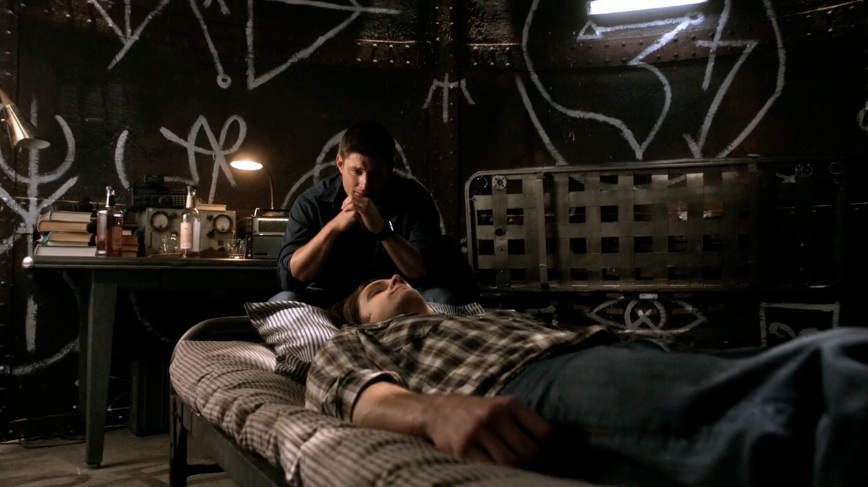
“Be of good cheer; thou livest; but my life hath long been given to death, that so I might serve the dead.” – Antigone
In the end, my reading of season six is one of hope rather than sadness. The terror of grief is that it undulates and folds back on itself, which extends its life and heightens its passion. Mourning is not only acceptance; it is the recognition that acceptance is necessary to move on. The audience reception to the sixth season of Supernatural demonstrates the power of grief and the problems in deferred mourning. When a community has reciprocated affection based on one set of rules, it is difficult to transfer that affection to another without a certain amount of resistance. The show uses the sixth season not only to tell a story, but to also tell the story of the story, to assist its audience in making the move beyond, the move toward something else.
Was this its intention? Probably not, but it was a result. To prohibit mourning is a dangerous game, as Creon sees in Antigone. The dead command the attention of the living just as much as the stage commands the attention of its audience. Season six, then, can be read not only as story but as meditation on what it means to mourn the beloved, but not alone, rather in the presence of the whole community. Even in your grief, you are not alone. At least, that’s the sixth season for me.
on the side of the road.”
Rumi, as translated by Coleman Barks
https://www.thewinchesterfamilybusiness.com/article-archives/season-six/16291-singing-the-sins-of-creon-spns-s6-and-the-prohibition-against-mourning


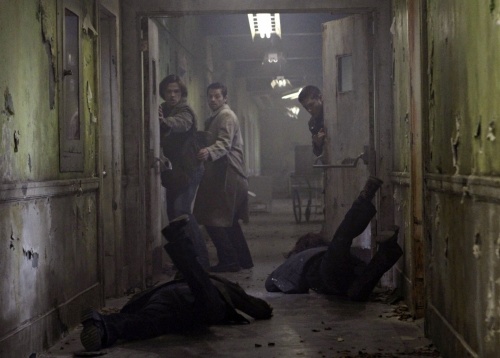
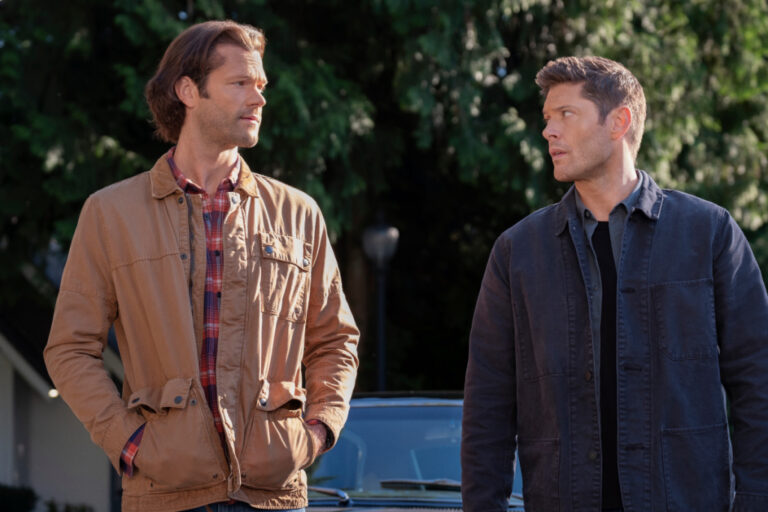
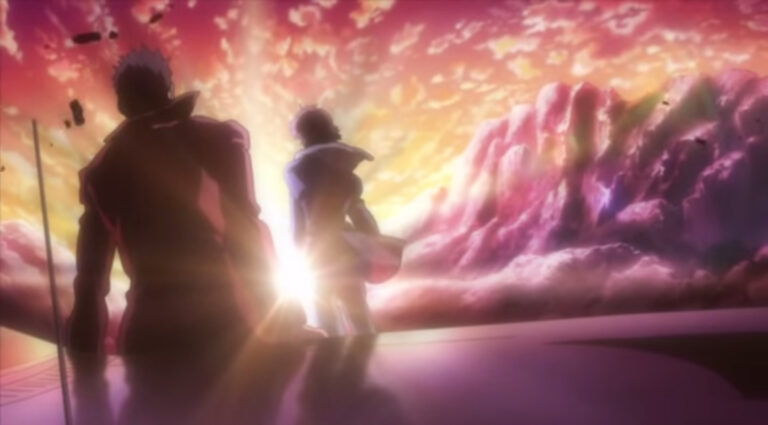
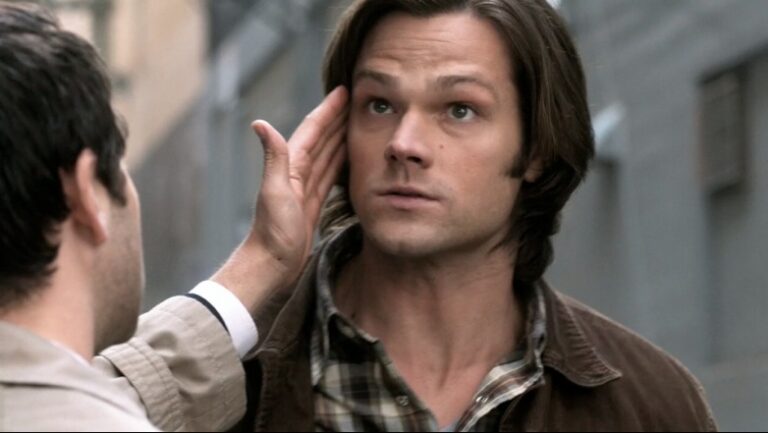
Powerful read. Thank you for the reprint; would have never found it otherwise. I am intent on re-watching season Six in the light of this article.
A great read, thank you, Bookdal. Though I’m not sure about this part:
[quote]With that said and given the full order of episodes in season six, I would state that Soulless Sam was the show’s bait and switch con on the audience. He was offered as the noir hero, when in point of fact, the angel Castiel was waiting in the wings to ascend to that role. In other words, the switch between Sam and Castiel was the corruption that upon which film noir capitalizes. The corruption of the hero, which weighed heavy on the classical hero of the story (Dean Winchester)[/quote]
Strange, but I after “Let it bleed” I didn’t have any doubts that noir hero of season 6 was Dean. I don’t know for sure, but I don’t think it’s a normal thing for a classical hero torture and kill dozens of possessed people, and then how it went onto season 7 with him not trusting anybody and being obssessed with revenge. Castiel didn’t seem to be so noir to me in season 6, just a person trying to do the right thing, and making mistakes because he felt betrayed by Dean, though I completely agree with you, that soulless Sam being a noir hero was a red herring.
That was a well written article, but I have little knowledge of noir style, as that is not my thing. All I know is that Soulless Sam was an interesting idea that went on too long. It was fascinating watching Dean’s journey as he tried to figure out what was wrong with Sam, but since Sammy was actually gone, as a viewer, I did mourn his loss. I might not have known why Sammy wasn’t there, but I felt his absence. Lose the Campbells, give Sam back his soul sooner, and then it would have been a great season.